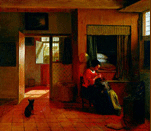5.
Gender and Race Crossing the English Atlantic
Organizers:
- Susan D. Amussen, History, Union Institute and University
- Kim F. Hall, English, Fordham University
- Jennifer Morgan, History, Rutgers University
Description:
This workshop explores the ways in which gender and race are figured in the
crossing of the Atlantic from England to the Caribbean. Travel narratives and
letters that reflect on English travelers in both Africa and the Caribbean provide
a useful lens for thinking about the ways in which place shapes interlocking
concepts of race and gender. English expansion in the 17th century led both
to increased contact with existing societies in Africa and the New World, and
the creation of new societies in England’s American colonies. These new
societies depended upon coerced labor and while initially that labor came from
indentured white servants, after the introduction of sugar to the Caribbean,
that labor was performed by enslaved people of African descent.
We will use this movement to explore the emergence and interrelationships of
gender and race. It uses as a central source Richard Ligon’s History of
Barbados (1657) which provides an account of Ligon’s own journey to Barbados
by way of the Cape Verde Islands, his three years on the island, as well as
a natural history and social description of the island in the early years of
the sugar revolution. Ligon was a royalist exile whose anomalous position in
Barbados rendered him an acute observer of social relations. His account is
particularly interesting because of the tensions between his broad generalizations
and his detailed descriptions. While Ligon serves as a critical source for the
early history of Barbados, his history cannot be read in any kind of straightforward
way. Ligon’s account will be supplemented by excerpts from a number of
other contemporary sources to provide additional perspective on the intersections
of race, gender and class in the 17th century Caribbean.
Readings will be posted on a limited access website prior to the conference;
participants will be invited to offer their own resources at the conference.
The organizers have each approached Ligon in the context of different projects:
Susan Amussen as a historian working on the English experience of settlement
in the Caribbean, for which Ligon provides a central account; Kim Hall as a
literary scholar working on aesthetic strategies used by the English to address
cultural changes brought about by Atlantic production of sugar; Jennifer Morgan
as a colonial historian working on a comparative study of enslaved women in
colonial Barbados and South Carolina.
For the workshop, we will begin by providing context for the readings—not
more than ten minutes of introduction—before opening the discussion to
the participants. The discussion will focus on the following questions:
- Who gets to define race? Gender? Who is silent?
- Are there competing definitions of race and gender operative here? Whose?
How are they manifest?
- What difference does place (i.e. Africa vs. Caribbean) make, if any?
- How does class complicate relations of race and/or gender?
In the last five minutes, we'll see whether we can come to any kind of concluding
formulations or models.
Required Readings:
- Richard Ligon, A True and Exact History of the Island of Barbados,
(1657), pp. 12-17, 46-8, 51-2.
- Pieter de Marees, Description and Historical Account of the Gold
Kingdom of Guinea (The Netherlands, 1602) translated from the Dutch
and edited by Albert van Dantzig and Adam Jones. (selection)
- Thomas Tryon, excerpt from “Of Spices, Their Nature and Operation”
in The Good Housewife Made Doctor. 1692. pp 101 (bottom par)
B 104.
- -----. excerpt from “A dialogue between and Ethiopian or Negro-Slave
and a Christian that was his Master in America” in Friendly
Advice to the Gentlemen Planters of the East and West Indies. London,
1684., pp. 114-115.
- Nicholas Villault, A Relation of the Coasts of Africk Called Guinee...
(London, 1670) (selection)
- William Whaley, letter to Col. William Helyar, 9 Dec. 1675 (Somerset R.O.,
DD/WHh1090/2/1)
Recommended Readings:
- Michael Banton. “The Idiom of Race: A Critique of Presentism.”
In Theories of Race and Racism: A Reader, ed. Les Back and
John Solomos. New York:Routledge, 2000.
- Kim F. Hall. “Culinary Spaces, Colonial Spaces: The Gendering of
Sugar in the Seventeenth Century.” In Feminist Readings of Early
Modern Culture: Emerging Subjects and Subjectivities, ed. Valerie
Traub, Lindsay Kaplan, and Dympna Callaghan. Cambridge: Cambridge University
Press, 1996: 168-90.
- Ivan W. Hannaford. Race: The History of an Idea in the West.
Washington, D.C.: Woodrow Wilson Center (1996), pp. 3-16.
- Jennifer Morgan. “‘Some Could Suckle over Their Shoulder’:
Male Travelers, Female Bodies, and the Gendering of Racial Ideology, 1500-1770.”William
and Mary Quarterly, 3rd Ser., 54:1 (1997), 167-92.





















